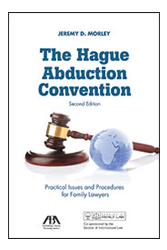
The Hague Abduction Convention, Second Edition, provides a clear explanation of how the Hague Convention on the Civil Aspects of International Child Abduction works in the United States.
Hague cases require an intimate knowledge of the Convention and of the voluminous case law that has developed around it. Hague cases also require a complete understanding of international child custody law in general and in particular, for U.S. practitioners, of the relationship between The Hague Convention and the Uniform Child Custody Jurisdiction & Enforcement Act.
The Convention operates in the U.S. in ways that differ from those in other Hague countries. This is because of the federal legislation that implements the treaty, the concurrence of federal and state jurisdiction, the lack of a specialized group of judges who handle cases under the Convention, the uniform state legislation on child custody jurisdiction, and a host of other factors.
Purpose of the Book
The purpose of the book is to explain as clearly as possible to family lawyers how the Hague Convention on the Civil Aspects of International Child Abduction works in the United States. The Convention operates in this country in ways that are different than in other Hague countries. This is because of the federal legislation that implements the treaty, the concurrence of federal and state jurisdiction, the lack of a specialized group of judges who handle cases under the Convention, the uniform state legislation on child custody jurisdiction and a host of other factors.
Voluminous Litigation
The treaty itself is short and to the point. Indeed, there are only three articles that legal practitioners really use to any significant degree in the vast majority of Hague cases, these being Articles 3, 12 and 13. Yet the Convention has spawned voluminous litigation, most especially in the United States. There are several reasons for that.
Handling Hague Cases
Handling Hague abduction cases is challenging and fulfilling. Hague cases are usually tried very quickly. Indeed, they are supposed to be entirely concluded within just six weeks. They require an intimate knowledge of the Convention and of the voluminous case law that has developed around it. They also require a complete understanding of international child custody law in general and in particular, for U.S. practitioners, of the relationship between the Hague Convention and the Uniform Child Custody Jurisdiction & Enforcement Act.
The Convention is misunderstood by very many family lawyers and, dare I say it, by family judges. A lawyer in a Hague case sometimes needs to provide a quick but respectful education to judges who have not handled any or many such cases before.
I have had the good fortune to have handled Hague cases in many jurisdictions throughout the United States and sometimes in foreign countries also, usually working collaboratively with local lawyers in each jurisdiction. I have also submitted expert evidence in many cases around the world where compliance with the Convention, either past or contemplated, has been an issue. Additionally, I have lectured on the Convention before federal and state judges in New York State, at international conferences of family law practitioners and at venues such as the Foreign Ministry of Japan. It is fulfilling and exciting work.

Country-by-Country Information About Child Abduction and Divorce
(Click to find your country)
IMPORTANT: WE REQUIRE SPECIFIC INFORMATION ABOUT YOUR SITUATION OR WE WILL NOT BE ABLE TO RESPOND.
POTENTIAL CLIENTS SHOULD NOT SEND ANY CONFIDENTIAL INFORMATION UNTIL SUCH TIME AS AN ATTORNEY-CLIENT RELATIONSHIP HAS BEEN ESTABLISHED BY A WRITTEN RETAINER AGREEMENT SIGNED BY BOTH THE ATTORNEY AND THE CLIENT. SENDING AN EMAIL DOES NOT CREATE AN ATTORNEY-CLIENT RELATIONSHIP OR CONTRACTUALLY OBLIGATE THE LAW OFFICE OF JEREMY D. MORLEY TO REPRESENT YOU, REGARDLESS OF THE CONTENT OF SUCH INQUIRY.
Potential clients should not send any confidential information until such time as an attorney-client relationship has been established by a written retainer agreement signed by both the attorney and the client. Sending an email does not create an attorney-client relationship or contractually obligate The Law Office of Jeremy D. Morley to represent you, regardless of the content of such inquiry.
Copyright © 2025 Jeremy Morley | Website Designed by MozWebMedia